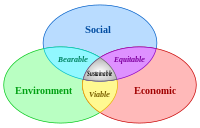
Photo from wikipedia
Abstract This study investigates the natural resources rent and financial development nexus by subsuming the critical role of institutional quality in this paradigm in a sample of 87 Emerging and… Click to show full abstract
Abstract This study investigates the natural resources rent and financial development nexus by subsuming the critical role of institutional quality in this paradigm in a sample of 87 Emerging and Developing Economies (EMDEs), during the period from 1984 to 2018. The findings demonstrate that natural resource rent undermines finance and supports the natural resource curse hypothesis in the financial sector of EMDEs. The institutional quality has a significant positive impact on finance and it positively moderates the resource-finance nexus. We argue that institutional quality checks some channels through which the natural resource curse operates and turns the resource curse into a blessing for the financial sector. Furthermore, the results document a threshold effect of institutional quality in the resource-finance relationship. Precisely, we found that natural resource rent positively explains finance once a certain threshold level of institutional quality is attained – below which the natural resource rent becomes a resource curse and hinders financial development. Therefore, policy attentions are recommended to promote finance by efficient utilization of natural resources through promoting and maintaining institutional quality beyond a certain threshold level and incorporating its vital role. Our results are robust to the use of different samples, alternative specifications, and alternative measures of finance and institutional quality and are particularly useful to the policymakers concerned about EMDEs.
Journal Title: Journal of Multinational Financial Management
Year Published: 2020
Link to full text (if available)
Share on Social Media: Sign Up to like & get
recommendations!